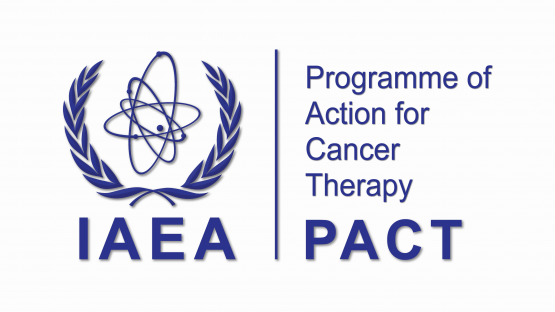The month of May was a busy one for PACT and its partners as imPACT missions to evaluate cancer programmes and facilities were carried out in the United Republic of Tanzania, Kenya, Madagascar and Viet Nam. These imPACT missions have been successful in providing further understanding of the cancer needs most prominent in each of these nations, making it easier for the IAEA and the World Health Organization (WHO), and other PACT partners to provide the services, equipment and training that is most urgently needed in each country to improve national cancer control programmes.
Understanding Cancer Needs in the Developing World
A Focus on Africa
Since its founding, Africa has been a major focus for the IAEA in its continued efforts to help Member States control the burden of cancer on the continent. As part of this increased effort, PACT has made a special undertaking to increase the number of imPACT reviews and follow-up missions to PACT Model Demonstration Site (PMDS) the United Republic of Tanzania, and also extend PACT's reach across the continent to new Member States who have requested assistance to move forward with national cancer control plans.
Tanzania
The first of the African Missions in May took place in the United Republic of Tanzania from 3-6 May. The purpose of this mission was to follow up on the progress of the PACT Model Demonstration Site's national cancer control plan and re-asses the changing cancer situation in the country. The mission visited both the long-established Ocean Road Cancer Institute in Dar es Salaam and a new cancer centre of increasing importance, Bugando Medical Centre, located in Mwanza, Tanzania's second largest city. Bugando has been increasing its capacity as an oncology centre after its staff received training in Italy and South Africa, through IAEA/WHO assisted efforts, and the Centre currently serves a population of 14 million. The mission also provided the opportunity to meet with the WHO country office and the Ministry of Health, two of PACT's strongest partners in the country, to solidify further the collaboration between these important organizations.
Kenya
Immediately following the imPACT mission to Tanzania, PACT experts departed to Kenya, to provide the nation with its first ever imPACT review. The mission visited Kenya's major cancer hospital, Kenyatta National Hospital, met with the Ministry of Health and spoke with doctors, government officials and oncologists throughout the country to establish a sound understanding of where Kenya stands in its attempt to control cancer, and what measures must be taken to ensure that the best possible treatment, prevention and care measures will be available to all of Kenya's citizens in the future. The cancer situation in Kenya is dire, with a severe lack of medical practitioners and a large number of new cancer cases being diagnosed annually. The imPACT team also met with the Rector of the African Virtual University (AVU), a distance learning apparatus currently in place in Africa, to identify potential areas of collaboration between AVU and PACT's VUCCnet project to build regional training networks and provide online learning tools for cancer control.
Madagascar
From 9 - 14 May a joint WHO/IAEA mission was conducted in Madagascar to finalize the country's National Cancer Control Strategy and Action Plan for Cancer Control. The mission was based out of Antananarivo, Madagascar, and its participants travelled throughout the country to tour the cancer facilities and monitor the nation's progress in cancer control. The team also attended a workshop to discuss the development of a key project, “Cervical and Breast Cancer Control in Madagascar”, a public — private project that includes the development of a National Cancer Centre and two Regional Cancer Centres.
Vietnam
The follow-up imPACT mission to PMDS Vietnam, May 17-21, provided an opportunity for WHO and IAEA to monitor the nation's progress on cancer control activities and re-assess the national cancer burden. It was found that the number of cancer centres and available equipment in the country has doubled, but that this increase has left the nation in need of training for medical staff. The mission's participants, including experts from India and Singapore, travelled to Ho Chi Minh City and Hanoi, while visiting cancer facilities and government offices throughout the country. The next mission to Vietnam is scheduled for the beginning of 2011.
About imPACT missions
Each imPACT mission is led by a member of the PACT Programme Office, accompanied by several cancer experts from IAEA, WHO and cancer institutions around the globe. These specialists, accompanied and guided by the local WHO Country Office experts, travel to the country to visit all local cancer centres, meet with medical staff, speak with national health ministries and, when possible, meet with other organizations involved in health support, such as bilateral donor agencies and prominent NGOs operating in the field. This allows PACT and partners to develop a better understanding of the cancer burden faced by each nation, as well as the current status of resources and infrastructure to fight the disease, in order to offer recommendations for the nation's future cancer control efforts, and help focus development assistance packages and fundraising goals.
In the past six months, PACT has also carried out imPACT missions in Albania, Serbia, Mongolia and Sri Lanka. PACT's next imPACT missions are scheduled to take place in Ghana, Niger, Mauritania, Senegal and Cote d'Ivoire throughout the summer of 2010.
The most recent imPACT missions were supervised by PACT staff members Rolando Camacho and Tobias Gauer.


